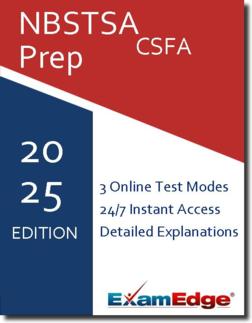NBSTSA CSFA (CSFA) Practice Tests & Test Prep by Exam Edge - FAQ
Based on 22 Reviews
- Real Exam Simulation: Timed questions and matching content build comfort for your NBSTSA CSFA test day.
- Instant, 24/7 Access: Web-based NBSTSA Certified Surgical First Assistant practice exams with no software needed.
- Clear Explanations: Step-by-step answers and explanations for your NBSTSA exam to strengthen understanding.
- Boosted Confidence: Reduces anxiety and improves test-taking skills to ace your NBSTSA Certified Surgical First Assistant (CSFA).

Why should I use Exam Edge to prepare for the NBSTSA Certified Surgical First Assistant Exam?
FAQ's for Exam Edge NBSTSA Certified Surgical First Assistant practice tests
- Comprehensive content: Exam Edge's NBSTSA Certified Surgical First Assistant practice tests are created specifically to prepare you for the real exam. All our NBSTSA CSFA practice test questions parallel the topics covered on the real test. The topics themselves are covered in the same proportions as the real test too, based on outlines provided by the National Board of Surgical Tech and Surgical Asst. in their NBSTSA CSFA test guidelines.
- Realistic practice: Our NBSTSA CSFA practice exams are designed to help familiarize you with the real test. With the same time limits as the real exam, Our NBSTSA practice tests enable you to practice your pacing and time management ahead of test day.
- Detailed explanations: As you complete your practice tests, we show you which questions you answered correctly and which ones you answered incorrectly, in addition to providing you with detailed step-by-step explanations for every single NBSTSA Certified Surgical First Assistant practice exam question.
- Performance insights: After you complete a practice test, we provide you with your raw score (how many you answered correctly) and our estimate of the NBSTSA CSFA score you would have received if you had taken the real test.
- Ease of access: Because all Our NBSTSA practice tests are web-based, there is no software to install. You can take NBSTSA CSFA practice exams on any device with access to the internet, at any time.
- Flexible use: If you must pause while taking one of Our NBSTSA practice exam, you can continue right where you left off. When you continue the test, you will start exactly where you were, and with the same amount of time you had remaining.
- Thousands of unique questions: We offer 25 different online practice exams with 2,500 unique questions to help you prepare for your NBSTSA Certified Surgical First Assistant !
- Low cost: The cost of ordering 5 practice tests is less than the cost of taking the real NBSTSA CSFA test. In other words, it would be less expensive to order 5 practice tests than to retake the real NBSTSA Certified Surgical First Assistant exam!
- Our trusted reputation: As a fully accredited member of the Better Business Bureau, we uphold the highest level of business standards. You can rest assured that we maintain all of the BBB Standards for Trust.
- Additional support: If you need additional help, we offer specialized tutoring. Our tutors are trained to help prepare you for success on the NBSTSA Certified Surgical First Assistant exam.
What score do I need to pass the NBSTSA CSFA Exam?
To pass the NBSTSA Certified Surgical First Assistant test you need a score of 64.
The range of possible scores is 0 to 100.
How do I know the practice tests are reflective of the actual NBSTSA Certified Surgical First Assistant ?
At Exam Edge, we are proud to invest time and effort to make sure that Our NBSTSA practice tests are as realistic as possible. Our practice tests help you prepare by replicating key qualities of the real test, including:
- The topics covered
- The level of difficulty
- The maximum time-limit
- The look and feel of navigating the exam
Do you offer practice tests for other National Board of Surgical Tech and Surgical Asst. subjects?
Yes! We offer practice tests for 2 different exam subjects, and there are 50 unique exams utilizing 5000 practice exam questions. Every subject has a free sample practice test you can try too!
NBSTSA Certified Surgical First Assistant
(CSFA
®
)
Practice Tests
NBSTSA Certified Surgical Technologist
(CST
®
)
Practice Tests
To order tests, or take a sample test, for a different subject:
Click on ' Name on the Exam Name' You will be take to the orders page
How do I register for the real National Board of Surgical Tech and Surgical Asst.?
For up-to-date information about registration for the National Board of Surgical Tech and Surgical Asst., refer to the National Board of Surgical Tech and Surgical Asst. website.


